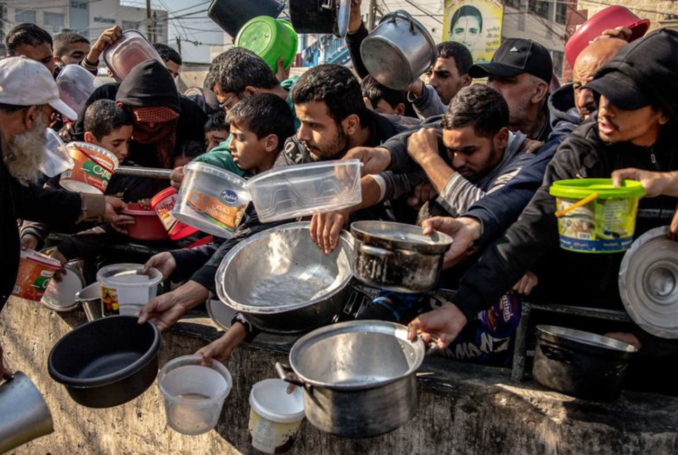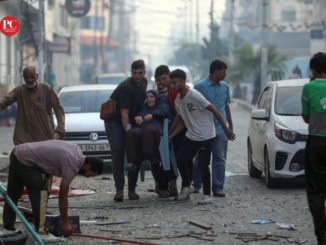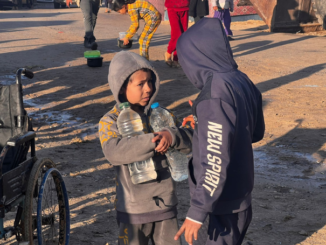
As winter grips Gaza, families face not only freezing cold and hunger, but the deep isolation of a world that turns its back.
As winter settles over Gaza, I am reminded of a time when the season held a different meaning. Back then, winter was a time for family gatherings—long, cozy nights spent sipping “sahlab,” our favorite hot drink, and huddling around the heater wrapped in warm blankets. We would spend the evening chatting, playing UNO, and other card games. The sound of rain would fill my heart with joy, and I would rush outside with my siblings, running beneath the raindrops, feeling the coolness on our faces. The earthy scent of petrichor would fill the air, reminding us of nature’s freshness after the rain. Those were simple, cherished moments—winter felt like a season of warmth, love, and togetherness.
Now, I wake up to the sound of rain, my heart heavy with sorrow. Winter has fully arrived in Gaza. Already, the cold has set in. Lying in bed, dressed in warm clothes, covered with two blankets, and surrounded by the walls of my home, I still feel the cold creeping through. My heart aches as I wonder: how do my people, living in tents, manage to survive this bitter season? With every drop of rain, my thoughts are with them—soaked through, their only shelter a flimsy piece of fabric. Many of these tents are pitched near the harsh and unforgiving winter sea.
‘Action Now’ – UN Says One Million Palestinians in Gaza Need Urgent Shelter before Winter
In Gaza, this winter is not just cold; it is a fight for survival. People are struggling against the biting chill, without proper clothing or heating. Just days ago, my cousins—who lost their home and are now living in a refugee tent—went to the market in search of warm clothes, only to return empty-handed, shocked and disheartened by the outrageous prices. When a thin, lightweight pajama costs $95, how can anyone afford warmth?
What might seem minor elsewhere—catching a cold or staying wet—is life-threatening here, especially for children and the elderly. These vulnerable groups suffer deeply, without access to treatment or medication, as Gaza’s hospitals are barely functioning. Already overwhelmed, they cannot offer care for even the most basic illnesses.
Hygiene, too, becomes nearly impossible, increasing the risk of illness. Living in tents with no access to warm water, people cannot shower or clean themselves properly. For mothers, doing laundry becomes even more grueling in winter, as the power outages in Gaza—now stretching beyond 400 days—prevent them from using washing machines. Instead, they wash clothes by hand with ice-cold water.
Despite the physical suffering, it is the psychological pain that cuts the deepest—the sight of mothers watching their children cry out in hunger through long, cold nights, yearning for food that has become nearly impossible to find. Even as I write these words, I am starving, having eaten nothing for many hours.
‘This Isn’t Real. It’s Just a Nightmare’ – Gaza, My Haven, My Loss
Gazans have long relied on UNRWA services for food and medicine, including food stamps provided by WFP, UNICEF, and UNRWA. But the Israeli-imposed ban on UNRWA has restricted aid from entering Gaza, exacerbating an already dire situation.
Famine is taking root, and it feels like an endless nightmare. The price of what little food is available is beyond belief. A single sack of flour now costs more than $300. How can anyone afford that? Even if we could, the flour is often infested with bugs and weevils, making it unusable. The bakeries that once served as a lifeline are now closed, unable to get supplies. Bread—the most basic of foods—has become a luxury few can afford. Hunger has overtaken our lives, leaving us in despair, knowing that tomorrow will likely bring more of the same, or worse.
We survive on one meal a day, and even that feels like a blessing. But the long winter nights make it harder, as people rely on “Takaya”—a charitable food distribution—that provides only small portions, barely enough to fill an empty stomach. These Takaya often begin at 11:00 am, leaving families with nothing to feed their children for the rest of the day. The cold bites through us, and hunger makes it even harder to bear.
I look around at the children—pale, thin, and exhausted by hunger and cold. I see families waiting in endless lines, holding empty containers, hoping to find food. I wonder how much more they can endure, how much more any of us can endure. This brutal reality is a daily struggle, with families searching for alternatives or relying on insufficient aid to feed their children. The scarcity of clean, affordable food is not just a challenge; it is a crisis that threatens the survival of an already vulnerable population.
Winter in Gaza is no longer a time of warmth and togetherness. It is a season of loneliness and isolation. The cruelest part of this suffering is the silence of a world that watches from afar but does nothing. As the cold nights stretch on, so does the isolation. Gazans are not just battling hunger and cold, but the deep ache of being cut off, both physically and emotionally, from the rest of humanity. In this forced seclusion, we wonder: does anyone truly hear our cries?

– Esraa Abo Qamar is a Gaza-based writer. She contributed, soon other platforms, to the writer collective We Are Not Numbers. She contributed this article to the Palestine Chronicle.









I absolutely feel for the Gazans and wish this terrible war will end very soon.